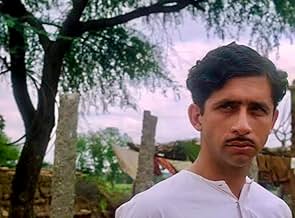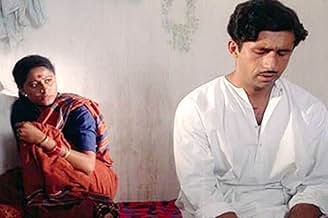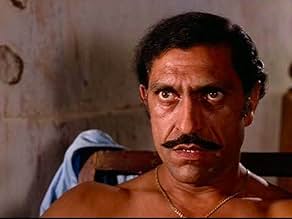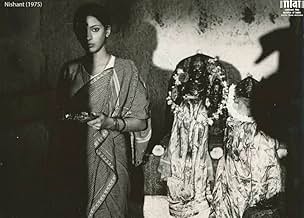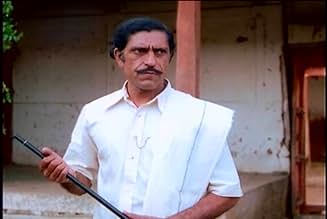Ajouter une intrigue dans votre langueA man whose wife is abducted seeks to have the culprits prosecuted for their crime, but no one will help him. Meanwhile, the wife-abused and berated by her abductors-cannot bring herself to ... Tout lireA man whose wife is abducted seeks to have the culprits prosecuted for their crime, but no one will help him. Meanwhile, the wife-abused and berated by her abductors-cannot bring herself to face her husband.A man whose wife is abducted seeks to have the culprits prosecuted for their crime, but no one will help him. Meanwhile, the wife-abused and berated by her abductors-cannot bring herself to face her husband.
- Réalisation
- Scénario
- Casting principal
- Récompenses
- 2 victoires et 2 nominations au total
Smita Patil
- Rukmani
- (as Smita)
Avis à la une
10jazzyjez
Shyam Benegal has a well-deserved reputation for making hard-hitting social dramas which tell true Indian stories in a realistic manner, so you'll find no concessions to Bollywood here. The plot is brutal and compelling, and the film features an all-star cast who give uniformly excellent performances.
Vishvam (Naseeruddin Shah) is one of four brothers who rule their feudal village in pre-independence India with an iron grip. They execute various criminal schemes to increase their own wealth at the expense of the villagers, with the village priest and constable powerless to stop them. However unlike his brothers he tries to lead a relatively restrained life, and at the start of the film we see him married and refraining from drinking and smoking.
His brothers regularly exercise their droit de seigneur, ordering villagers to send their wives and daughters to the haveli so that they can be raped at leisure. At first Vishvam, restrained by his wife (played by beautiful and brilliant but tragically short-lived Smita Patil), refuses to join them. However when the new school teacher arrives with his young child and lovely wife he finds himself tempted, and the brothers abduct her.
The rest of the film concerns the resolution of the abduction, with the villagers forced to make tough ethical decisions. The film ends in a shocking way which will leave audiences deeply disturbed, which is no doubt the cause of the low score that this film has received. However upon reflection the ending is thoroughly realistic, and provides a deep and unsettling insight into the human condition.
Shyam Benegal grew up in rural India and so this film, which is based upon a true story, draws closely upon his own perceptions of village India and the people that inhabit it. However the story has universal appeal, and reveals how people's lives play out in the many parts of the world where civilization is still primitive and brutal.
I am sad but unsurprised to see this film receive such low ratings. No doubt the viewers who rated it will have been expecting light Bollywood style entertainment, or at least some kind of feelgood resolution.
This is an excellent social drama in the tradition of Ankur and Mandi, and should be seen by anyone interested in compelling stories, excellent acting and the realities of village life in the developing world.
Vishvam (Naseeruddin Shah) is one of four brothers who rule their feudal village in pre-independence India with an iron grip. They execute various criminal schemes to increase their own wealth at the expense of the villagers, with the village priest and constable powerless to stop them. However unlike his brothers he tries to lead a relatively restrained life, and at the start of the film we see him married and refraining from drinking and smoking.
His brothers regularly exercise their droit de seigneur, ordering villagers to send their wives and daughters to the haveli so that they can be raped at leisure. At first Vishvam, restrained by his wife (played by beautiful and brilliant but tragically short-lived Smita Patil), refuses to join them. However when the new school teacher arrives with his young child and lovely wife he finds himself tempted, and the brothers abduct her.
The rest of the film concerns the resolution of the abduction, with the villagers forced to make tough ethical decisions. The film ends in a shocking way which will leave audiences deeply disturbed, which is no doubt the cause of the low score that this film has received. However upon reflection the ending is thoroughly realistic, and provides a deep and unsettling insight into the human condition.
Shyam Benegal grew up in rural India and so this film, which is based upon a true story, draws closely upon his own perceptions of village India and the people that inhabit it. However the story has universal appeal, and reveals how people's lives play out in the many parts of the world where civilization is still primitive and brutal.
I am sad but unsurprised to see this film receive such low ratings. No doubt the viewers who rated it will have been expecting light Bollywood style entertainment, or at least some kind of feelgood resolution.
This is an excellent social drama in the tradition of Ankur and Mandi, and should be seen by anyone interested in compelling stories, excellent acting and the realities of village life in the developing world.
'Nishaant' is perhaps Benegal's most chilling movie to date. With this movie who also introduces the ever so talented Smita Patil to Hindi cinema. Through brilliant execution and with superb cinematography, Shyam Benegal tells us this compelling, brutally honest and haunting tragic story. The background music brilliantly adds to the mood. While dealing with various themes such as oppression, corruption, power, violence, abduction and poverty, he also presents controversial taboo issues like rape and homosexuality. 'Nishaant' is also quite graphic in nature. Particularly the scene where Anjaiya and Prasad gang rape Sushila is disturbing to watch and then there's the shattering ending which haunts the viewer.
Like in all of Benegal's films, the actors do nothing short of a fantastic job. Amrish Puri gives a restrained performance and his silence makes his character much more frightening than any of the over-the-top villain roles he was more known for. Shabana Azmi is sublime. Smita Patil is very effective in a small but strong role. With a brave choice, she already proves that she's here to stay and if it weren't for her untimely death one would have witnessed more of India's best actress on screen. Naseeruddin Shah is excellent. Mohan Agashe and Anant Nag are scary as the evil brothers. Girish Karnad too is great.
Benegal also deserves mention for portraying unusual relationships between the characters. When Sushila encounters her husband, she resents him for not rescuing her and chooses to come back to the 'zameendar's haveli' instead of going back home. Yet, she too is conflicted as she terribly misses her son but also develops an attraction towards her kidnappers' brother Vishwam (the only sympathetic brother in the household). There's Rukmani who was once proud of her faithful husband Vishwam but she perceives Sushila as a threat and once her husband begins a physical relationship with her, it becomes resentment.
'Nishaant' is based on a true story and Benegal portrays the realities of a village sensibly as he shows a good understanding of life in the village. Although there have been plenty of films that try to use the same themes, they lack the gritty rawness of 'Nishaant'. Overall, 'Nishaant' is an excellent compelling drama that needs to be watched.
Like in all of Benegal's films, the actors do nothing short of a fantastic job. Amrish Puri gives a restrained performance and his silence makes his character much more frightening than any of the over-the-top villain roles he was more known for. Shabana Azmi is sublime. Smita Patil is very effective in a small but strong role. With a brave choice, she already proves that she's here to stay and if it weren't for her untimely death one would have witnessed more of India's best actress on screen. Naseeruddin Shah is excellent. Mohan Agashe and Anant Nag are scary as the evil brothers. Girish Karnad too is great.
Benegal also deserves mention for portraying unusual relationships between the characters. When Sushila encounters her husband, she resents him for not rescuing her and chooses to come back to the 'zameendar's haveli' instead of going back home. Yet, she too is conflicted as she terribly misses her son but also develops an attraction towards her kidnappers' brother Vishwam (the only sympathetic brother in the household). There's Rukmani who was once proud of her faithful husband Vishwam but she perceives Sushila as a threat and once her husband begins a physical relationship with her, it becomes resentment.
'Nishaant' is based on a true story and Benegal portrays the realities of a village sensibly as he shows a good understanding of life in the village. Although there have been plenty of films that try to use the same themes, they lack the gritty rawness of 'Nishaant'. Overall, 'Nishaant' is an excellent compelling drama that needs to be watched.
10cera-3
I saw this film when it was released in the 70's, I was about 15 or so. I watched it again yesterday on DVD and once again was blown away by it brilliant acting, story, dialogue and subject matter.
I love Indian mainstream cinema, it has a big place in Indian culture, which very unfortunately and sadly is dismissed by many as kitch, but popular culture is popular culture and it has it's importance in society.
This movie on the other hand, is a perfect example of the other side of Indian cinema. I really wish movies by such great Indian directors (contemporary), can be shown in the West in regular cinemas (not small little places in remote parts of cities). To balance the mainstream of songs, dance, melodrama etc., we have this other cinema, which is so amazing, intelligent and brilliant, and very unfortunately has not been exposed to the NA market. It's just too sad!
I love Indian mainstream cinema, it has a big place in Indian culture, which very unfortunately and sadly is dismissed by many as kitch, but popular culture is popular culture and it has it's importance in society.
This movie on the other hand, is a perfect example of the other side of Indian cinema. I really wish movies by such great Indian directors (contemporary), can be shown in the West in regular cinemas (not small little places in remote parts of cities). To balance the mainstream of songs, dance, melodrama etc., we have this other cinema, which is so amazing, intelligent and brilliant, and very unfortunately has not been exposed to the NA market. It's just too sad!
This movie is a timeless classic. One more feather to the cap of the director Shyam Benegal. This movie was nominated for Cannes film festival and unfortunately did not win any award. Again Benegal takes us on a tour of rural Andhra and he does it with his characteristic grace and élan. The camera work is as usual good which can be expected of a Benegal movie. The music is good and above all , all the actors have turned in performances of their life time. Smita Patil, though in a not so significant role, excels. Shabana as usual shines. The fall of the feudal system because of it's excesses is very ably painted on the celluloid screen. Again this movie was a commercial failure, and the time of it's release was witnessing a birth of a phenomenon of Bollywood , Amitabh. Maybe that was the reason for this movie's failure at the box office. But again the movie going masses in India have always treated the alternative cinema in a not so fair manner, so this movie was no exception.
The only small defect that anyone can point out in such movies, is the facial makeup of the main characters. Always the heroes and heroines are a stand out from the general crowds. But again one may condone them as a matter of artistic or artiste's liberty.
Any collector of movies should cherish this movie.
The only small defect that anyone can point out in such movies, is the facial makeup of the main characters. Always the heroes and heroines are a stand out from the general crowds. But again one may condone them as a matter of artistic or artiste's liberty.
Any collector of movies should cherish this movie.
Review By Kamal K
This is the story of Shyam Benegal's Nishant, a well-made film which portrays the state of those times' rural India. The film depicts a reality which is a bit difficult to see. The proceedings are very serious and the film is dark and dim.
In a feudal village in the 1940s, the village's new schoolmaster's wife, Sushila (Shabana Azmi), is abducted for the enjoyment of the zamindar's cruel, depraved younger brothers. The schoolmaster tries to recover her through official channels, including the local police official (Kulbushan Kharbanda), but meets everything from indifference to abject fear of the powerful zamindar (Amrish Puri). In the meantime, Suhsila tries to make the best of her imprisonment, demanding concessions like trips to the temple to worship and access to her own kitchen where she can prepare her meals with some dignity. The zamindar's youngest (and most uncertain) brother, Vishwam (Naseeruddin Shah) shows signs of being in love with her, to the chagrin of his wife Rukmini (Smita Patil), who bristles at the possibility that Sushila may come to replace her. Eventually, the local pandit - through most of the film another pawn of the zamindar - incites the schoolmaster and the rest of the town to revolt against the zamindar's tyrrany, with indiscriminately tragic results.
Girish Karnad is excellent as the tormented teacher who loses his wife and is unable to get her back. Shabana Azmi is outstanding as Sushila in a restrained and deep act. I particularly liked her outburst at her husband. Her anger was so easy to relate to. Smita Patil makes her acting debut with this very film and though her part is small, she makes the best of every scene she appears in. Amrish Puri is successfully frightening as the merciless Zamindar. Naseeruddin Shah is as always wonderful and his character is very sympathetic despite the conflict it creates. The boy who plays Sushila's son is extremely cute.
This movie is a timeless classic. One more feather to the cap of the director Shyam Benegal. This movie was nominated for Cannes film festival and unfortunately did not win any award.
Nishant is a good film, a disturbing, real and engaging piece. What is particularly likeable about the film is its unpredictability right until the very final scenes. But the main complaint is that it was a tad too slow. While in the second half it gets far more enjoyable, and the film is thoroughly engaging thanks to its story and fantastic execution, the pace was still somewhat dragged, and at times will make you like squirming in my seat. Nonetheless, it's a worthy effort. To those who expect to be purely entertained, this may not be the right film, but those who appreciate artistic excellence will definitely enjoy watching this picture.
This is the story of Shyam Benegal's Nishant, a well-made film which portrays the state of those times' rural India. The film depicts a reality which is a bit difficult to see. The proceedings are very serious and the film is dark and dim.
In a feudal village in the 1940s, the village's new schoolmaster's wife, Sushila (Shabana Azmi), is abducted for the enjoyment of the zamindar's cruel, depraved younger brothers. The schoolmaster tries to recover her through official channels, including the local police official (Kulbushan Kharbanda), but meets everything from indifference to abject fear of the powerful zamindar (Amrish Puri). In the meantime, Suhsila tries to make the best of her imprisonment, demanding concessions like trips to the temple to worship and access to her own kitchen where she can prepare her meals with some dignity. The zamindar's youngest (and most uncertain) brother, Vishwam (Naseeruddin Shah) shows signs of being in love with her, to the chagrin of his wife Rukmini (Smita Patil), who bristles at the possibility that Sushila may come to replace her. Eventually, the local pandit - through most of the film another pawn of the zamindar - incites the schoolmaster and the rest of the town to revolt against the zamindar's tyrrany, with indiscriminately tragic results.
Girish Karnad is excellent as the tormented teacher who loses his wife and is unable to get her back. Shabana Azmi is outstanding as Sushila in a restrained and deep act. I particularly liked her outburst at her husband. Her anger was so easy to relate to. Smita Patil makes her acting debut with this very film and though her part is small, she makes the best of every scene she appears in. Amrish Puri is successfully frightening as the merciless Zamindar. Naseeruddin Shah is as always wonderful and his character is very sympathetic despite the conflict it creates. The boy who plays Sushila's son is extremely cute.
This movie is a timeless classic. One more feather to the cap of the director Shyam Benegal. This movie was nominated for Cannes film festival and unfortunately did not win any award.
Nishant is a good film, a disturbing, real and engaging piece. What is particularly likeable about the film is its unpredictability right until the very final scenes. But the main complaint is that it was a tad too slow. While in the second half it gets far more enjoyable, and the film is thoroughly engaging thanks to its story and fantastic execution, the pace was still somewhat dragged, and at times will make you like squirming in my seat. Nonetheless, it's a worthy effort. To those who expect to be purely entertained, this may not be the right film, but those who appreciate artistic excellence will definitely enjoy watching this picture.
Le saviez-vous
- AnecdotesActress Smita Patil's debut film.
Meilleurs choix
Connectez-vous pour évaluer et suivre la liste de favoris afin de recevoir des recommandations personnalisées
- How long is Nishant?Alimenté par Alexa
Détails
- Durée2 heures 20 minutes
- Mixage
Contribuer à cette page
Suggérer une modification ou ajouter du contenu manquant

